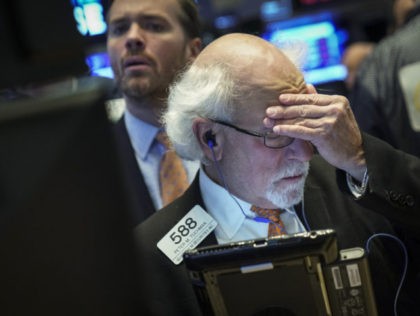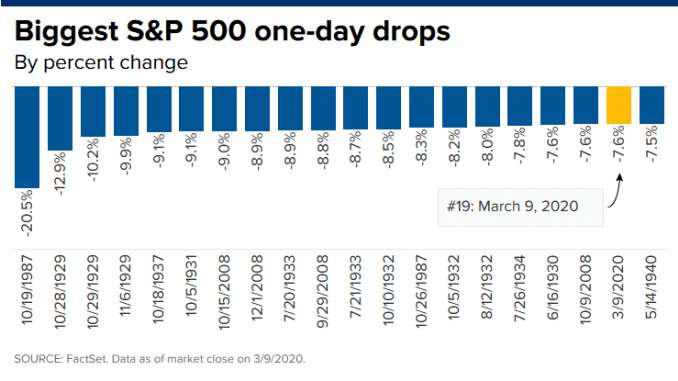Stock trading halted for 15 minutes after the S&P 500 craters 7%

Article by Yun Li and Eustance Huang in "CNBC Markets":
Stocks tumbled on Monday as investors braced for the economic fallout from the spreading coronavirus, while a shocking all-out oil price war added to the anxiety.
The Dow Jones Industrial Average tanked more than 1,800 points at the open. The S&P 500 dropped 7%. The massive sell-off triggered key market circuit breakers in morning trading. Trading was halted for 15 minutes at 9:35 a.m. ET.
The sharp declines followed a roller-coaster week that saw the S&P 500 swing up or down more than 2.5% for four days straight. While Monday’s drop is poised to be significant, it still wouldn’t crack the 20 worst days in the S&P 500.
 Investors
continued to seek safer assets amid additional fears that the
coronavirus will disrupt global supply chains and tip the economy into a
recession. The yield on the benchmark 10-year Treasury note dropped below 0.5% for the first time ever, while the 30-year rate breached 1%.
Investors
continued to seek safer assets amid additional fears that the
coronavirus will disrupt global supply chains and tip the economy into a
recession. The yield on the benchmark 10-year Treasury note dropped below 0.5% for the first time ever, while the 30-year rate breached 1%.
Saudi Arabia on Saturday slashed official crude selling prices
for April, in a sudden U-turn from previous attempts to support the oil
market as the coronavirus hammers global demand. The move came after
OPEC talks collapsed Friday, prompting some strategists to see oil
prices crater to $20 this year.
“Crude has become a bigger problem
for markets than the coronavirus,” Adam Crisafulli, founder of Vital
Knowledge, said Sunday. “It will be virtually impossible for the
[S&P 500] to sustainably bounce if Brent continues to crater,” he
added.
International benchmark Brent crude futures plummeted 29.07% to $32.11 per barrel after dropping 30% earlier. U.S. West Texas Intermediate crude futures dropped 30.98% to $28.49 per barrel, on track for its worst day since 1991. The Energy Select Sector SPDR Fund (XLE), which tracks the energy sector, tumbled 15%.
Bank
stocks are getting smashed as lower yields put pressure on their
margins, while an oil crash could cause energy companies to default on
their obligations. JPMorgan plunged more than 11%.
Investors have
already been on edge about the coronavirus outbreak that caused major
stock averages to tumble into correction territory. As of Sunday, global
cases of the infection have climbed to more than 109,000
with at least 3,801 deaths around the world. The situation is also
worsening in the U.S. with New York, California and Oregon all declaring
a state of emergency.
“The idea that lower gasoline prices is
going to put more cash in workers’ pockets and give consumer spending
and the economy a boost doesn’t seem to cushion the blow for stock
market investors,” Chris Rupkey, MUFG Union Bank’s chief financial
economist, said in a note Sunday. “They want out. Big time. The sky is
falling. Get out, get out while you can. Wall Street’s woes have to
eventually hit Main Street’s economy hard.”
Gold, another
safe-haven asset, crossed $1,700 an ounce, hitting its highest level
since Dec. 2012. Meanwhile, copper prices hit a more than three-year low
of $2.46. Copper is seen as a barometer of broad economic demand given
its applications in electrical equipment and manufacturing.
The Federal Reserve announced
an emergency rate cut last week to combat the economic impact from the
virus, its first such move since the financial crisis. President Donald
Trump on Friday signed a sweeping spending bill of an $8.3 billion package to aid medical research.
The New York Fed said Monday it will increase the amount of money
it is offering to banks for their short-term funding needs. To make
sure the funding, or repo, markets are working properly, the central
bank said it will up the amount it offers in overnight operations from
$100 billion to $150 billion through Thursday.
Traders expect the
central bank to slash rates by three-quarters of a percentage point at
its upcoming March meeting. Chances for a full percentage point cut this
month were at 29.2%, according to the CME FedWatch tracker.The iShares High Yield Corporate Bond ETF (HYG)
fell 4.5%, on concerns that a oil price crash will cause many small
energy companies to default, hitting the high yield credit market that
they’ve become so a large part of.




Post a Comment